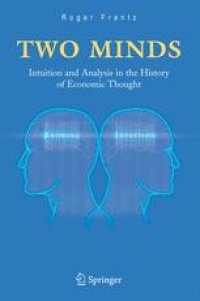
Ebook: Two Minds: Intuition and Analysis in the History of Economic Thought
Author: Roger Frantz (auth.)
- Tags: Economics general, Methodology and the History of Economic Thought, Artificial Intelligence (incl. Robotics), Cognitive Psychology
- Year: 2005
- Publisher: Springer US
- Edition: 1
- Language: English
- pdf
As everyone knows, intuition is warm and fuzzy, qualitative, not measurable. Economics, on the other hand, is quantitative, and if it is not a hard science, at least it is the "queen of the social sciences." It is, therefore, intuitively obvious, that intuition and economics are as if oil and water. The problem is, what is intuitively obvious is not always correct. And, there are two major reasons why intuition and economics are not like oil and water. First, economics concerns itself with decision making, and decisions are made in the brain. The human brain is the size of a grapefruit, weighing three pounds with approximately 180 billion neurons, each physically independent but interacting with the other neurons. What we call intuition is, like decision making, a natural information processing function of the brain. Second, despite the current emphasis on quantitative analysis and deductive logic there is a rich history of economists speaking about intuition. First, the human brain, specifically the neocortex, has a left and right hemisphere. The specialized analytical style of the left hemisphere and the specialized intuitive style of the right hemispheres complement each other.
The "Two Minds" noted economist Roger Frantz explores in this landmark book are, first, the analytical mind and, second, the intuitive mind. In part one he presents the leading theories on intuition, discusses recent developments in cognitive science, and borrows from such non-economist intuitors as Albert Einstein, Jonas Salk, Henri Poincare, Ludwig von Beethoven, and Robert Louis Stevenson to explore the role of intuition in science and creativity.
In part two, Frantz considers the presumably analytic and logical nature of economics and then demonstrates the many ways in which economists from Adam Smith to Herbert Simon have relied on intuition as a fruitful mental activity.
This book provides a rich complement and alternative perspective to some of the theoretical and mathematical models that have dominated the dismal science since the late 1940s.
The "Two Minds" noted economist Roger Frantz explores in this landmark book are, first, the analytical mind and, second, the intuitive mind. In part one he presents the leading theories on intuition, discusses recent developments in cognitive science, and borrows from such non-economist intuitors as Albert Einstein, Jonas Salk, Henri Poincare, Ludwig von Beethoven, and Robert Louis Stevenson to explore the role of intuition in science and creativity.
In part two, Frantz considers the presumably analytic and logical nature of economics and then demonstrates the many ways in which economists from Adam Smith to Herbert Simon have relied on intuition as a fruitful mental activity.
This book provides a rich complement and alternative perspective to some of the theoretical and mathematical models that have dominated the dismal science since the late 1940s.
Content:
Front Matter....Pages I-X
Introduction To Intuition....Pages 1-19
Adam Smith. New Intuitions For A New Age....Pages 21-37
John Stuart Mill. An Anti-Intuitionist Social Reformer....Pages 39-57
Alfred Marshall. Metaphysician and Economist....Pages 59-75
Intuition and Analysis in the Economics of the John Maynard Keynes....Pages 77-94
Frank Knight. Intuition, Risk and Uncertainty....Pages 95-111
Swimming Against the Stream. Herbert Simon, Harvey Leibenstein, George Shackle, Friedrich von Hayek....Pages 113-133
Intuition in Current Economic Literature....Pages 135-151
Back Matter....Pages 153-178
The "Two Minds" noted economist Roger Frantz explores in this landmark book are, first, the analytical mind and, second, the intuitive mind. In part one he presents the leading theories on intuition, discusses recent developments in cognitive science, and borrows from such non-economist intuitors as Albert Einstein, Jonas Salk, Henri Poincare, Ludwig von Beethoven, and Robert Louis Stevenson to explore the role of intuition in science and creativity.
In part two, Frantz considers the presumably analytic and logical nature of economics and then demonstrates the many ways in which economists from Adam Smith to Herbert Simon have relied on intuition as a fruitful mental activity.
This book provides a rich complement and alternative perspective to some of the theoretical and mathematical models that have dominated the dismal science since the late 1940s.
Content:
Front Matter....Pages I-X
Introduction To Intuition....Pages 1-19
Adam Smith. New Intuitions For A New Age....Pages 21-37
John Stuart Mill. An Anti-Intuitionist Social Reformer....Pages 39-57
Alfred Marshall. Metaphysician and Economist....Pages 59-75
Intuition and Analysis in the Economics of the John Maynard Keynes....Pages 77-94
Frank Knight. Intuition, Risk and Uncertainty....Pages 95-111
Swimming Against the Stream. Herbert Simon, Harvey Leibenstein, George Shackle, Friedrich von Hayek....Pages 113-133
Intuition in Current Economic Literature....Pages 135-151
Back Matter....Pages 153-178
....